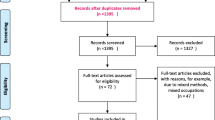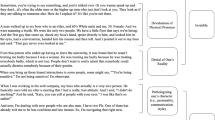Abstract
Leadership development is a core value of Maternal Child Health Bureau training programs. Mentorship, an MCH Leadership Competency, has been shown to positively affect career advancement and research productivity. Improving mentorship opportunities for junior faculty and trainees may increase pursuit of careers in areas such as adolescent health research and facilitate the development of new leaders in the field. Using a framework of Developmental Networks, a group of MCH Leadership Education in Adolescent Health training program faculty developed a pilot mentoring program offered at the Society for Adolescent Health and Medicine Annual Meeting (2011–2013). The program matched ten interdisciplinary adolescent health fellows and junior faculty with senior mentors at other institutions with expertise in the mentee’s content area of study in 2011. Participants were surveyed over 2 years. Respondents indicated they were “very satisfied” with their mentor match, and all agreed or strongly agreed that the mentoring process in the session was helpful, and that the mentoring relationships resulted in several ongoing collaborations and expanded their Developmental Networks. These results demonstrate that MCH programs can apply innovative strategies to disseminate the MCH Leadership Competencies to groups beyond MCH-funded training programs through programs at scientific meetings. Such innovations may enhance the structure of mentoring, further the development of new leaders in the field, and expand developmental networks to provide support for MCH professionals transitioning to leadership roles.
Similar content being viewed by others
References
MCH Leadership Competencies Workgroup (Editors). (2009). Maternal and Child Health Leadership Competencies.
Palepu, A., Friedman, R. H., Barnett, R. C., et al. (1998). Junior faculty members’ mentoring relationships and their professional development in U.S. medical schools. Academic Medicine, 73(3), 318–323.
Sambunjak, D., Straus, S. E., & Mausic, A. (2006). Mentoring in academic medicine. Journal of the American Medical Association, 296, 1103–1115.
Illes, J., Glover, G. H., Wexler, L., et al. (2000). A model for faculty mentoring in academic medicine. Academic Radiology, 7(9), 717–724.
Tracy, E. E., Jagsi, R., Starr, R., et al. (2004). Outcomes of a pilot faculty mentoring program. American Journal of Obstetrics and Gynecology, 191, 1846–1850.
Blood, E. A., Ullrich, N. J., Hirshfeld-Becker, D. R., et al. (2012). Academic women faculty: Are they finding the mentoring they need? Journal of Women’s Health, 21(11), 1201–1208.
Higgins, M. C., & Kram, K. E. (2001). Reconceptualizing mentoring at work: A developmental network perspective. The Academy of Management Review, 26(2), 264–288.
Higgins, M. C., & Thomas, D. A. (2001). Constellations and careers: Toward understanding the effects of multiple developmental relationships. Journal of Organizational Behavior, 22(3), 223–247.
Emans, S. J., Milstein, M., Seely, E. W., et al. (2012). Becoming and effective leader and mentor: Strengthening your developmental network. http://www.childrenshospital.org/~/media/Research%20and%20Innovation/Research%20Administration/community%20of%20mentors/EffectiveLeaderMentor.ashx. Accessed 20 Sept 2013.
Emans, S. J., Milstein, M., Seely, E. W. (2012). Mapping your developmental network exercise. http://www.childrenshospital.org/~/media/Research%20and%20Innovation/Research%20Administration/community%20of%20mentors/2012Mentoring_DevelopmentalNetworkExercise.ashx. Accessed 20 Sept 2013.
Lawrence, R. S., Gootman, J. A., & Sim, L. J. (2008). Adolescent health services: Missing opportunities. Washington, DC: National Research Council and Institute of Medicine of the National Academies.
Trent, M., & Cheng, T. L. (2010). Meeting the needs of adolescents: Pediatric medical education and workforce development. Pediatrics, 125(1), 191–192.
Emans, S. J., Milstein, M., Dobriner, J. (2012). Community of mentors: Guidelines for mentors. Office of faculty development, Boston Children’s Hospital. http://www.childrenshospital.org/cfapps/research/data_admin/Site2209/Documents/2012MentorGuidebook.pdf. Accessed 10 Sept 2013.
Wortmann, C. (2006). What’s your story: Using stories to ignite performance and be more successful. Chicago, IL: Kaplan Publishing.
Acknowledgments
We would like to acknowledge the Maternal Child Health Bureau/HRSA for the funding of the Leadership Education in Adolescent Health (LEAH)projects: T71MC00009 (Boston LEAH, PI Emans), T71MC08054 (Johns Hopkins LEAH, PI Adger), T71MC00006 (Minnesota LEAH, PI Resnick), T71MC00003 (UCSF LEAH, PI Irwin), T71MC242100202 (U Washington LEAH PI Walker), T71MC0000820 (Indiana LEAH, PI Rickert), DC Baltimore Research Center on Child Health Disparities P20 MD 000198, from the National Institute on Minority Health and Health Disparities (PI Cheng); and the William T. Grant Foundation (#12119, PI Emans) for the initial phase of this project.
Author information
Authors and Affiliations
Corresponding author
Rights and permissions
About this article
Cite this article
Blood, E.A., Trent, M., Gordon, C.M. et al. Leadership in Adolescent Health: Developing the Next Generation of Maternal Child Health Leaders Through Mentorship. Matern Child Health J 19, 308–313 (2015). https://doi.org/10.1007/s10995-014-1619-4
Published:
Issue Date:
DOI: https://doi.org/10.1007/s10995-014-1619-4




